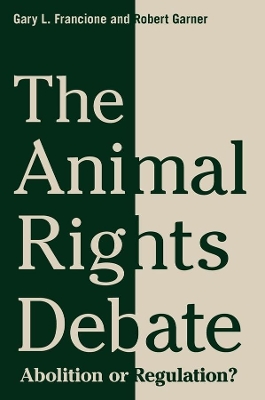Critical Perspectives on Animals: Theory, Culture, Science, and Law
2 total works
Gary L. Francione is a law professor and leading philosopher of animal rights theory. Robert Garner is a political theorist specializing in the philosophy and politics of animal protection. Francione maintains that we have no moral justification for using nonhumans and argues that because animals are property--or economic commodities--laws or industry practices requiring "humane" treatment will, as a general matter, fail to provide any meaningful level of protection. Garner favors a version of animal rights that focuses on eliminating animal suffering and adopts a protectionist approach, maintaining that although the traditional animal-welfare ethic is philosophically flawed, it can contribute strategically to the achievement of animal-rights ends. As they spar, Francione and Garner deconstruct the animal protection movement in the United States, the United Kingdom, Europe, and elsewhere, discussing the practices of such organizations as PETA, which joins with McDonald's and other animal users to "improve" the slaughter of animals.
They also examine American and European laws and campaigns from both the rights and welfare perspectives, identifying weaknesses and strengths that give shape to future legislation and action.
They also examine American and European laws and campaigns from both the rights and welfare perspectives, identifying weaknesses and strengths that give shape to future legislation and action.
Most people care about animals, but only a tiny fraction are vegan. The rest often think of veganism as an extreme position. They certainly do not believe that they have a moral obligation to become vegan.
Gary L. Francione-the leading and most provocative scholar of animal rights theory and law-demonstrates that veganism is a moral imperative and a matter of justice. He shows that there is a contradiction in thinking that animals matter morally if one is also not vegan, and he explains why this belief should logically lead all who hold it to veganism. Francione dismantles the conventional wisdom that it is acceptable to use and kill animals as long as we do so "humanely." He argues that if animals matter morally, they must have the right not to be used as property. That means that we cannot eat them, wear them, use them, or otherwise treat them as resources or commodities.
Why Veganism Matters presents the case for the personhood of nonhuman animals and for veganism in a clear and accessible way that does not require any philosophical or legal background. This book offers a persuasive and powerful argument for all readers who care about animals but are not sure whether they have a moral obligation to be vegan.
Gary L. Francione-the leading and most provocative scholar of animal rights theory and law-demonstrates that veganism is a moral imperative and a matter of justice. He shows that there is a contradiction in thinking that animals matter morally if one is also not vegan, and he explains why this belief should logically lead all who hold it to veganism. Francione dismantles the conventional wisdom that it is acceptable to use and kill animals as long as we do so "humanely." He argues that if animals matter morally, they must have the right not to be used as property. That means that we cannot eat them, wear them, use them, or otherwise treat them as resources or commodities.
Why Veganism Matters presents the case for the personhood of nonhuman animals and for veganism in a clear and accessible way that does not require any philosophical or legal background. This book offers a persuasive and powerful argument for all readers who care about animals but are not sure whether they have a moral obligation to be vegan.

